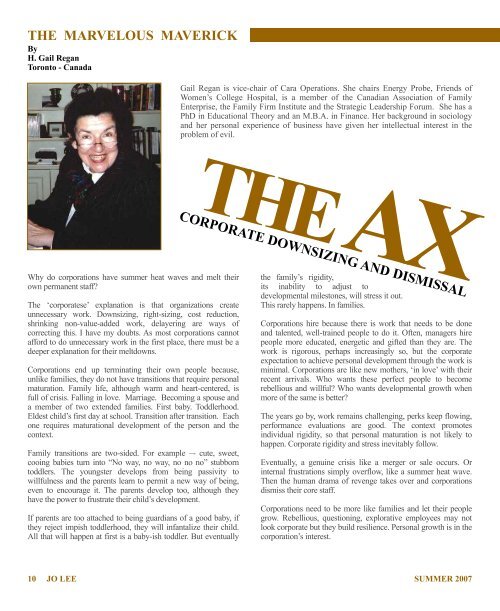WITS END - JO LEE Magazine
WITS END - JO LEE Magazine
WITS END - JO LEE Magazine
You also want an ePaper? Increase the reach of your titles
YUMPU automatically turns print PDFs into web optimized ePapers that Google loves.
THE MARVELOUS MAVERICK<br />
By<br />
H. Gail Regan<br />
Toronto - Canada<br />
Gail Regan is vice-chair of Cara Operations. She chairs Energy Probe, Friends of<br />
Women’s College Hospital, is a member of the Canadian Association of Family<br />
Enterprise, the Family Firm Institute and the Strategic Leadership Forum. She has a<br />
PhD in Educational Theory and an M.B.A. in Finance. Her background in sociology<br />
and her personal experience of business have given her intellectual interest in the<br />
problem of evil.<br />
THE AX<br />
CORPORATE DOWNSIZING AND DISMISSAL<br />
Why do corporations have summer heat waves and melt their<br />
own permanent staff?<br />
The ‘corporatese’ explanation is that organizations create<br />
unnecessary work. Downsizing, right-sizing, cost reduction,<br />
shrinking non-value-added work, delayering are ways of<br />
correcting this. I have my doubts. As most corporations cannot<br />
afford to do unnecessary work in the first place, there must be a<br />
deeper explanation for their meltdowns.<br />
Corporations end up terminating their own people because,<br />
unlike families, they do not have transitions that require personal<br />
maturation. Family life, although warm and heart-centered, is<br />
full of crisis. Falling in love. Marriage. Becoming a spouse and<br />
a member of two extended families. First baby. Toddlerhood.<br />
Eldest child’s first day at school. Transition after transition. Each<br />
one requires maturational development of the person and the<br />
context.<br />
Family transitions are two-sided. For example –- cute, sweet,<br />
cooing babies turn into “No way, no way, no no no” stubborn<br />
toddlers. The youngster develops from being passivity to<br />
willfulness and the parents learn to permit a new way of being,<br />
even to encourage it. The parents develop too, although they<br />
have the power to frustrate their child’s development.<br />
If parents are too attached to being guardians of a good baby, if<br />
they reject impish toddlerhood, they will infantalize their child.<br />
All that will happen at first is a baby-ish toddler. But eventually<br />
the family’s rigidity,<br />
its inability to adjust to<br />
developmental milestones, will stress it out.<br />
This rarely happens. In families.<br />
Corporations hire because there is work that needs to be done<br />
and talented, well-trained people to do it. Often, managers hire<br />
people more educated, energetic and gifted than they are. The<br />
work is rigorous, perhaps increasingly so, but the corporate<br />
expectation to achieve personal development through the work is<br />
minimal. Corporations are like new mothers, ‘in love’ with their<br />
recent arrivals. Who wants these perfect people to become<br />
rebellious and willful? Who wants developmental growth when<br />
more of the same is better?<br />
The years go by, work remains challenging, perks keep flowing,<br />
performance evaluations are good. The context promotes<br />
individual rigidity, so that personal maturation is not likely to<br />
happen. Corporate rigidity and stress inevitably follow.<br />
Eventually, a genuine crisis like a merger or sale occurs. Or<br />
internal frustrations simply overflow, like a summer heat wave.<br />
Then the human drama of revenge takes over and corporations<br />
dismiss their core staff.<br />
Corporations need to be more like families and let their people<br />
grow. Rebellious, questioning, explorative employees may not<br />
look corporate but they build resilience. Personal growth is in the<br />
corporation’s interest.<br />
10 <strong>JO</strong> <strong>LEE</strong> SUMMER 2007

















